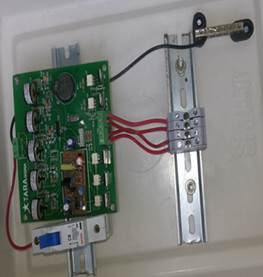|
Technology
Aspects for Scaling Rural Micro Grids T he rural micro grid business has an emerging market in the power starved rural areas of India. One of the aspects that can make this business model viable is faster replication through scaling up. However, the challenge to this is that replication of these grids involves deploying manpower on the ground for each site. Increased requirements of manpower related expenses in recruiting, training and sustaining them for each site singularly is not economically viable from a business perspective.To provide sustainable and scalable solutions, the
Society for Technology and Action for Rural Advancement (TARA) is
involved in creating energy access in rural India through many path
breaking projects. One such ongoing project is called SPEED (Smart Power
for Environmentally-sound Economic Development). The central theme of
this project is to provide clean energy solutions to households,
commercial establishments and enterprises through renewable energy based
rural micro grids. Under this project, TARA plans to erect 300
sustainable micro grids in the next three years. The challenge involved
in this scale-up ambition and plan is to manage all the sites on a long
term basis in a viable, profitable and sustainable manner.
TARA is rising up to this challenge by developing several new technologies to ensure quality services to the customers with lesser requirement of dedicated manpower so that these micro grids become sustainable and replicable. One area that TARA has been working extensively on is the electronics based IT enabled technologies for better load and revenue management. In the traditional model, this requires dedicated and supervised staff to be placed at each grid to manage load and revenues. One approach to tackle this is through the ‘smart meters’ that monitors consumers. However these smart meters are quite costly as of now. High prices of these smart meters has encouraged TARA to develop its own low cost technology driven solution for cheaper last mile connectivity and better management. A robust yet cost effective framework of IT and electronic technologies is essential for scaling up of rural micro grid businesses. These systems help in monitoring multiple clusters from anywhere in the world. They also provide useful data insights on customer behavior and profitability for all the sites. Another technology that TARA has developed is the Load Limiting Device which can limit the power of an individual consumer based on the set load limit. The units available for use are fixed based on a monthly recharge plan opted by a consumer. The main purpose of the limiter is to stop consumers from drawing more power than the set limit which is determined by the recharge plan that they have paid for. This helps to set a discipline within the community as well as tackles the problems of possible energy theft. Consumers cannot bypass this device since the load controlling device is installed at the pole level. In the event of someone trying to overdraw power, the individual consumer’s load gets disconnected. Another major achievement of TARA has been to introduce the SMS based recharge system at the rural level. Each village has one or multiple Point of Sales (POS) persons who collect money and recharge the packages used by the consumers in a community. Whenever a consumer recharges, the POS sends out a SMS to a specific number given to him by TARA and in return the customer receives a SMS that his account has been credited. TARA has already started piloting these technologies at a few sites in Saran and Supaul districts of Bihar and the initial response to these technologies from all types of stakeholders involved in this entire process have been extremely encouraging and positive. The balance between scaling up micro grids and yet being viable and profitable is very much attainable if IT and technology solutions are innovated and integrated smoothly into the last mile management. q Sreyashee Das
|
